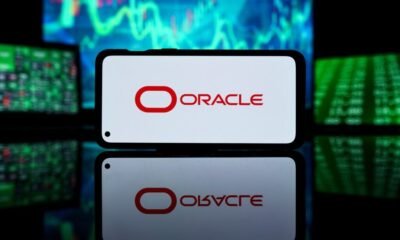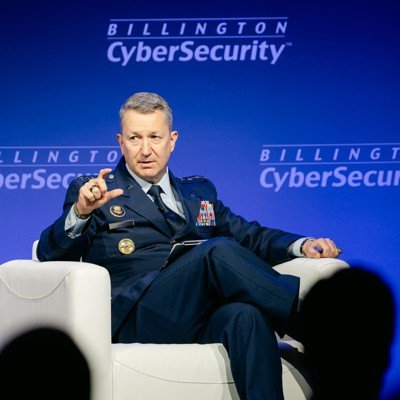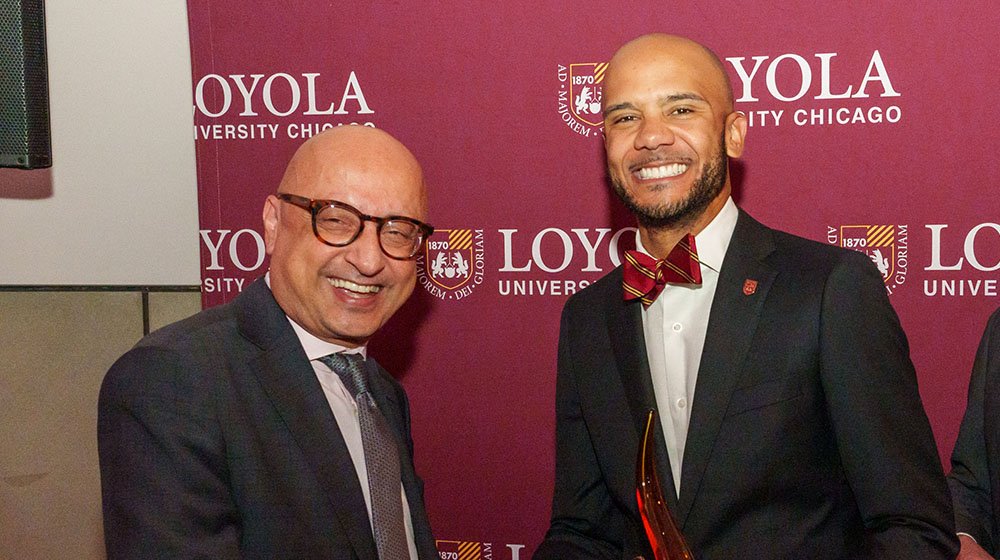Wayne Kimball Jr. (right) and Dean Michael Behnam after Kimball received the 2024 Rambler on the Rise Award from Loyola’s Office of Alumni Relations.
When he was seven years old, Wayne Kimball Jr. sold watermelons on the side of the road in rural North Carolina. A few years later, he would build and fix computers in his neighborhood. With a can-do attitude and drive to find new solutions, he worked his way up from there to being a leader for tech giant Google, where he now serves as the Global Head of Growth Strategy & Market Acceleration for Google Cloud’s Business Intelligence portfolio.
Kimball’s journey has taken him around the globe, from North Carolina to Silicon Valley to the Midwest to his current home in Los Angeles. But regardless of where he has lived and worked, Kimball has remained committed to helping others, both as a Quinlan alumnus and as a community leader.
Exploring new horizons
Kimball had nearly a decade of experience in business operations, strategic investments, and management consulting before he returned to Google in 2020. There, he served as Principal for the Cloud M&A business, and subsequently as the Head of AI Strategy and Operations for Google Cloud.
“Working in corporate strategy roles at Google has a truly fulfilling opportunity because we are building for the future in spaces that don’t currently exist,” Kimball said. “I love the challenge of building the plane while flying it.”
Kimball led the integration of Mandiant, Google Cloud’s largest acquisition. In his current role, he is building global programs to accelerate business growth in alignment with the business intelligence product roadmap, delivering ‘artificial intelligence for business intelligence’ so that customers can talk to their data.
“How AI is applied varies depending on the use case and the industry,” Kimball said. “The application can be broad and scalable, yet very nuanced at the same time. AI in the medical field can be very different from AI in retail or logistics or higher education. There’s a lot of work being done to develop niche solutions for very specific use cases.”
Breaking down barriers
When he’s not seeking the next advancement in AI, Kimball works to elevate others. He says entrepreneurship is what helped him unlock the American dream and build wealth, but he learned early on that opportunity wasn’t always equitable.
“I found that despite the community’s need for entrepreneurship, entrepreneurs of color had disproportionally lower resources, particularly lacking access to networks and capital, which directly impacts opportunity for success and sustainability,” Kimball said.
Throughout his career, Kimball has volunteered and held leadership roles in organizations aimed at lifting and empowering communities that have been historically cut off from opportunity. Wayne has remained civically engaged by serving as the Western Regional Vice President of Alpha Phi Alpha Fraternity, Inc, the oldest intercollegiate historically African American fraternity founded at Cornell University in 1906, along with 100 Black Men of America.
Staying connected
Kimball has remained highly involved with the Quinlan community, with frequent in-person visits to Quinlan classrooms, virtual visits with MBA classes, hosting undergraduate students during the Quinlan Ramble, and meetings with other alumni. In Los Angeles, he is an active member of Loyola’s regional alumni community.
This commitment to Quinlan was recognized in 2024 when Kimball was awarded Loyola’s Rambler on the Rise award, which recognizes alumni who are servant leaders in their communities, exemplify excellence in their fields, and are engaged with Loyola after graduation. Returning to campus to accept the award brought back fond memories. That same year, he was elected to the Quinlan Dean’s Board of Advisors.
“It’s always special when you can go back to the place that contributed so much to the person and professional that you are,” Kimball said. “I was incredibly honored to be nominated, let alone receive the award.”
He credits Quinlan with helping to shape him into the transformational global leader he is today. “I’ve always been a firm believer that you should be proud of where you work, go to school, and your family, and I’m proud to be a Loyola alum and more directly a Quinlan alum,” said Kimball.
Learn more











































